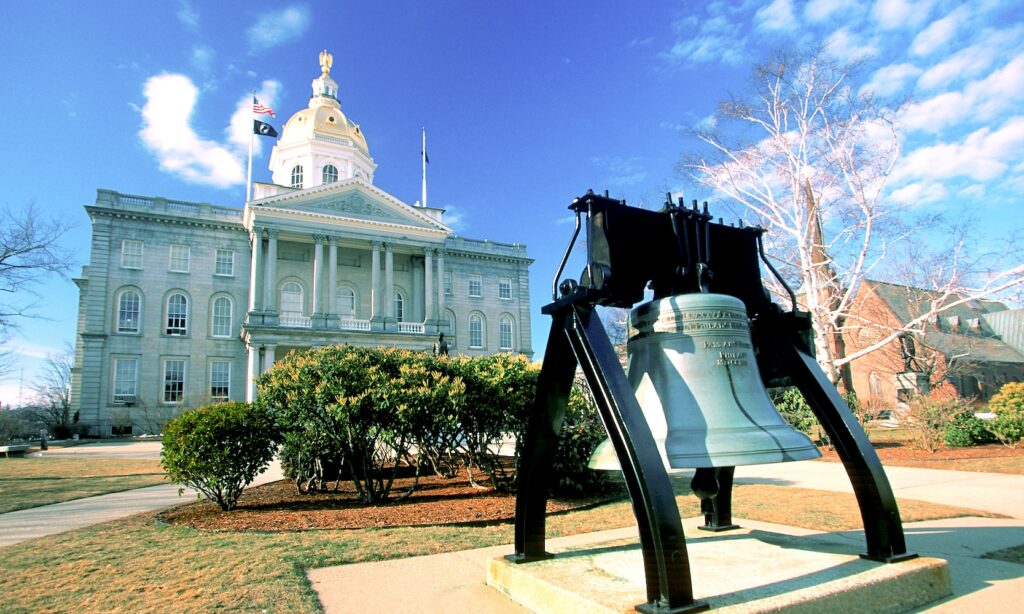Dems’ New Hampshire bill would require all students, including those in private or home schools, to take state assessments
Legislation introduced by three Democrats in the New Hampshire state House would require all public, private and home school students to take standardized statewide assessments.
If passed, the…

Legislation introduced by three Democrats in the New Hampshire state House would require all public, private and home school students to take standardized statewide assessments.
If passed, the requirement would also include students participating in the Education Freedom Accounts (EFA) program.
Reps. Corinne Cascadden, D-Coos-5, Peggy Balboni, D-Rockingham-38, and Hope Damon, R-Sullivan-8, introduced House Bill 1610-FN on Feb. 8.
The legislation states students “in all school districts, public, nonpublic, and all learning environments” are required to take “a statewide assessment,” once in each level of schooling – elementary, middle, and high school.
For grades 3 through 8, when the statewide test is not administered, “the school district, in consultation with the department and as part of the statewide education improvement and assessment program, shall develop and administer its own assessment or shall administer a standardized assessment that identifies a pupil’s range of learning and yields objective data to use in improving instruction and learning.”
Homeschooled students “shall contact their local school districts to participate in the statewide assessment,” the legislation continues. “Private schools shall contact the department of education to participate in the statewide assessment.”
According to the New Hampshire Department of Education, the EFA program, which launched in 2021, “allows eligible New Hampshire students to direct state funded per-pupil education adequacy grants toward eligible educational programming of their choice.”
The program already has a testing mandate, but offers choices, according to EdChoice:
- a standardized norm-referenced achievement test,
- statewide student assessment test, or
- maintaining a portfolio of student progress managed by a certified teacher or teacher currently teaching in a nonpublic school.
In the Granite State, as in other states, mandatory state assessments for school choice students have sparked criticism from some education freedom advocates, especially over concerns that state tests are Common Core aligned.
“Make no mistake about this one: if this legislation is passed, it essentially allows the GOVT/STATE to control our private, religious, and home schools,” Ann Marie Banfield, a New Hampshire veteran education researcher and parent advocate, warned at Granite Grok Thursday. “HOW? By requiring all children to take the STATE Standardized Test.
“Currently, students who participate in the school choice program (EFA) can take the standardized test offered at their private, religious, or home school. This legislation would change that. All students would have to take the STATE standardized test, which is COMMON CORE ALIGNED.”
Banfield spoke to The Lion about her concerns, and why she believes the bill hurts school choice.
“I have always wanted parents to have options when it comes to their child’s education,” Banfield said. “Public schools are failing many of our kids but some of these school choice programs lead to state regulations. This means the private schools lose their autonomy. ‘Government funded’ equals ‘government controlled.’”
When lawmakers vote to require their “state” standardized tests for students in private and religious schools, those schools end up aligning their curriculum with those tests, Banfield says.
She believes it is an intentional move by opponents of school choice, who seek to “destroy the programs that have been put in place” by “regulating the private and religious schools into submission,” superficially in the name of accountability for tax dollars.
In a Jan. 27 opinion column at Fox News, Corey DeAngelis, national director of research at American Federation for Children, and Jason Bedrick, a research fellow with the Heritage Foundation’s Center for Education Policy, celebrated the “school choice revolution” throughout the country and made a point of encouraging homeschooling families to take advantage of school choice options.
“In addition to private school tuition, most of these new programs allow families to use their children’s taxpayer-funded education dollars to cover certain homeschool expenses,” DeAngelis and Bedrick wrote, directly addressing those with concerns that school choice could bring about greater government regulation of private education, including homeschooling:
“The concern that ‘with government shekels come government shackles’ is understandable, but misplaced. Shackles can be imposed even without subsidies, and states that have education choice policies tend to respect homeschooling autonomy more than those that don’t.”
“The government can already regulate private education without providing any funding. Funding need not come with burdensome regulations.”
Additionally, growing the number of families able to take taxpayer funding for homeschooling means creating a more powerful lobby to keep government regulations at bay, they said.
“As more families benefit from private and home education, the coalition willing to fight for the autonomy of private education will also grow.”
Still, DeAngelis and Bedrick admit while the school choice model is a good one, it has some trade-offs as well.
“School choice isn’t a perfect solution, but it’s the most viable option we have today,” they reasoned.
For this reason, Sheri Few, founder and president of United States Parents Involved in Education, says school choice funding through tax credits is the “safest way” to make educational choice affordable while keeping government control at bay.
“The safest way to make alternatives to government schools affordable is through tax credits at the state and federal levels,” she wrote at Townhall in a January column. “The federal child tax credit should be increased for parents who do not enroll their children in government schools and states with income taxes should follow suit.”
Few explained an increase in federal child tax credits for parents who do not use the public school system will allow parents to keep more of their money to pay for expenses for the best education fit for their child.



